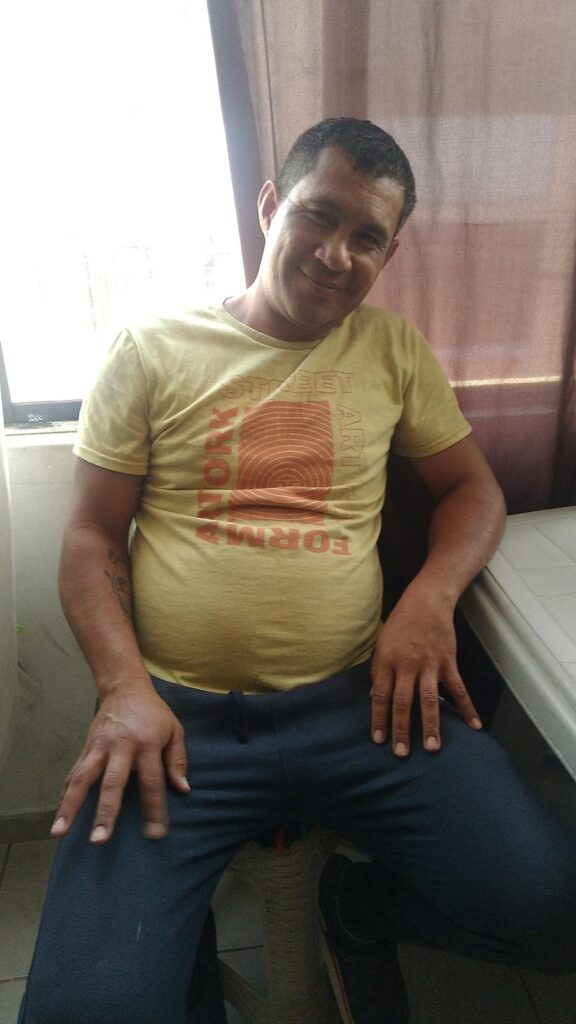Transferred to a Rio Grande detention center, Euder was last heard from in mid-March 2025. Days later, ICE confirmed his deportation but gave no details. Eira, his partner, later discovered he had been deported to El Salvador and has since had no contact with him. His family remains in distress, uncertain of his location or safety.
Credit: RFK Human Rights
Euder, 41, is originally from Caracas, Venezuela. His partner Eira describes him as a hard worker who accepts any job that comes his way. Eira, his partner of 17 years, has two children: a 21-year-old and a 30-year-old. In 2020, Eira emigrated to Ecuador with their oldest son. A year later, in 2021, Euder and his youngest son joined them in the province of Ambato, near Quito.
In 2022, the eldest son decided to make the journey to the United States. Finally, on May 10, 2023, Eira arrived in the U.S. She received Temporary Protected Status (TPS) and a work permit.
In June 2024, Euder and his youngest son were selected by the International Organization for Migration (IOM) for resettlement and reunification with his family in the United States, and completed all the formalities, including medical and criminal background checks. Euder and his youngest son entered the country on September 10, 2024 through the human mobility program.
However, upon arrival at the airport, his son was detained by immigration because of a tattoo; he was separated from Euder without explanation, even the IOM could not understand the reason behind this action, and deported back to Ecuador, he is still there. Meanwhile, Euder was incarcerated in Montgomery, Houston, because there was no way to deport him to Ecuador, as he did not possess an Ecuadorian visa.
At the jail, the family sought an attorney to inform them of their options. The lawyer suggested that they would need a sponsor for Euder’s release. Despite finding one, they were unsuccessful in getting him released. The attorney recommended that Euder apply for deportation, but he refused, opting instead to apply for asylum. They presented all the necessary evidence and, on January 17, 2025, Euder had a first hearing. During the hearing, a prosecutor labeled him as a member of Tren de Aragua, which resulted in a deportation order and the denial of his asylum request. According to his partner’s testimony, Euder had no opportunity to defend himself.
He was subsequently transferred to a detention center in Rio Grande. The last time Eira had contact with him was on March 15 at 2 p.m., at which time Euder informed her that an ICE agent suggested the possibility of being deported to Mexico, as the process to Venezuela was taking time. However, Euder believed he would be deported to his home country.
On Sunday, Eira tried to contact Rio Grande, but got no information. Reading the news, she feared that Euder had been transferred to a different location. She called Rio Grande again on Monday and, this time, they confirmed that Euder had been deported on Saturday, although they were unable to inform her of his current whereabouts.
Finally, on Thursday, March 20, Eira found Euder’s name on a list of people who had been deported to El Salvador, so far she has not had access to him or a lawyer. The uncertainty about his situation and the lack of communication has left Eira in a state of anguish as she awaits answers about the fate of her partner and father of her children.
Credit: RFK Human Rights
Euder, de 41 años, es originario de Caracas, Venezuela. Su pareja, Eira, lo describe como un hombre trabajador que acepta cualquier empleo que se le presente. Eira, su compañera desde hace 17 años, tiene dos hijos: uno de 21 años y otro de 30. En 2020, Eira emigró a Ecuador con su hijo mayor. Un año después, en 2021, Euder y su hijo menor se unieron a ellas en la provincia de Ambato, cerca de Quito.
En 2022, el hijo mayor decidió emprender el viaje hacia los Estados Unidos. Finalmente, el 10 de mayo de 2023, Eira llegó a EE.UU. y recibió el Estatus de Protección Temporal (TPS) y un permiso de trabajo.
En junio de 2024, Euder y su hijo menor fueron seleccionados por la Organización Internacional para las Migraciones (OIM) para ser reasentados y reunificados con su familia en Estados Unidos, y completaron todos los trámites, incluyendo exámenes médicos y antecedentes penales. Euder y su hijo menor ingresaron al país el 10 de septiembre de 2024 mediante el programa de movilidad humana.
Sin embargo, al llegar al aeropuerto, su hijo fue detenido por inmigración debido a un tatuaje; fue separado de Euder sin explicación alguna, y ni siquiera la OIM pudo entender la razón detrás de esta acción. Fue deportado a Ecuador, donde permanece hasta ahora. Mientras tanto, Euder fue encarcelado en Montgomery, Houston, ya que no se le podía deportar a Ecuador por no contar con una visa ecuatoriana.
La familia buscó un abogado para conocer sus opciones. El abogado indicó que necesitarían un patrocinador para la liberación de Euder. A pesar de conseguir uno, no lograron liberarlo. El abogado recomendó que Euder solicitara la deportación, pero él se negó y optó por solicitar asilo. Presentaron toda la evidencia necesaria y, el 17 de enero de 2025, Euder tuvo su primera audiencia. Durante la audiencia, un fiscal lo acusó de pertenecer al Tren de Aragua, lo que resultó en una orden de deportación y la negación de su solicitud de asilo. Según el testimonio de su pareja, Euder no tuvo oportunidad de defenderse.
Posteriormente fue trasladado a un centro de detención en Río Grande. La última vez que Eira tuvo contacto con él fue el 15 de marzo a las 2 p.m., cuando Euder le informó que un agente de ICE le había dicho que podría ser deportado a México, ya que el proceso hacia Venezuela estaba tardando. Sin embargo, Euder creía que sería deportado a su país natal.
El domingo, Eira intentó comunicarse con Río Grande, pero no obtuvo información. Al leer las noticias, temió que Euder hubiera sido trasladado a otro lugar. Llamó nuevamente a Río Grande el lunes y, esta vez, le confirmaron que había sido deportado el sábado, aunque no pudieron informarle su paradero actual.
Finalmente, el jueves 20 de marzo, Eira encontró el nombre de Euder en una lista de personas deportadas a El Salvador. Hasta ahora, no ha podido comunicarse con él ni ha logrado acceso a un abogado. La incertidumbre sobre su situación y la falta de comunicación han dejado a Eira en un estado de angustia mientras espera respuestas sobre el destino de su pareja y padre de sus hijos.
Crédito: RFK Human Rights







Comments
One response to “Euder Jose Torres Herrera ”
this is the original source
https://rfkhumanrights.org/our-impact/justice/international-justice/rfk-human-rights-el-salvador-delegation-to-investigate-trumps-unlawful-deportations/#euder
I did a cut and copy of just his section of the document
Euder José Torres
Separated from his family and deported without an opportunity to defend himself, Euder’s fate remains uncertain.
Euder, 41, is originally from Caracas, Venezuela. His partner Eira describes him as a hard worker who accepts any job that comes his way. Eira, his partner of 17 years, has two children: a 21-year-old and a 30-year-old. In 2020, Eira emigrated to Ecuador with their oldest son. A year later, in 2021, Euder and his youngest son joined them in the province of Ambato, near Quito.
Euder, Eira, and their son.
In 2022, the eldest son decided to make the journey to the United States. Finally, on May 10, 2023, Eira arrived in the U.S. She received Temporary Protected Status (TPS) and a work permit. In June 2024, Euder and his youngest son were selected by the International Organization for Migration (IOM) for resettlement and reunification with his family in the United States, and completed all the formalities, including medical and criminal background checks. Euder and his youngest son entered the country on September 10, 2024 through the human mobility program.
However, upon arrival at the airport, his son was detained by immigration because of a tattoo; he was separated from Euder without explanation, even the IOM could not understand the reason behind this action, and deported back to Ecuador, he is still there. Meanwhile, Euder was incarcerated in Montgomery, Houston, because there was no way to deport him to Ecuador, as he did not possess an Ecuadorian visa.
At the jail, the family sought an attorney to inform them of their options. The lawyer suggested that they would need a sponsor for Euder’s release. Despite finding one, they were unsuccessful in getting him released. The attorney recommended that Euder apply for deportation, but he refused, opting instead to apply for asylum. They presented all the necessary evidence and, on January 7, 2025, Euder had his latest hearing. On January 17, he was notified of the judge’s decision—a deportation order and denial of his asylum claim, due to being mislabeled as a member of Tren de Aragua. According to his partner’s testimony, Euder had no opportunity to defend himself.
He was subsequently transferred to a detention center in Rio Grande. The last time Eira had contact with him was on March 15 at 2 p.m., at which time Euder informed her that an ICE agent suggested the possibility of being deported to Mexico, as the process to Venezuela was taking time. However, Euder believed he would be deported to his home country.
On Sunday, Eira tried to contact Rio Grande, but got no information. Reading the news, she feared that Euder had been transferred to a different location. She called Rio Grande again on Monday and, this time, they confirmed that Euder had been deported on Saturday, although they were unable to inform her of his current whereabouts.
Finally, on Thursday, March 20, Eira found Euder’s name on a list of people who had been deported to El Salvador, so far she has not had access to him or a lawyer. The uncertainty about his situation and the lack of communication has left Eira in a state of anguish as she awaits answers about the fate of her partner and father of her children.